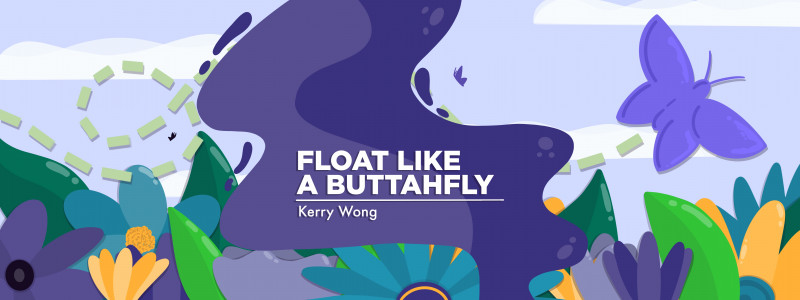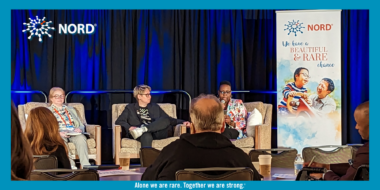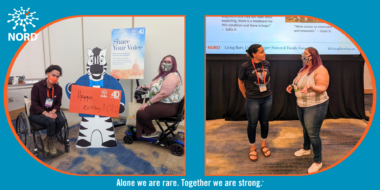Making memories and forging friendships at a rare disease forum
The power of connecting with other 'zebras' affected by rare disorders
Written by |

“People will forget what you said, people will forget what you did, but people will never forget how you made them feel.”
While the origins of this quote are uncertain, it is often attributed to writer and activist Maya Angelou. But even if Angelou didn’t actually say this, she made me feel it.
And that’s the idea that’s stuck with me since I attended the National Organization for Rare Disorders’ (NORD) Living Rare, Living Stronger Patient and Family Forum in Washington, D.C., earlier this month. Between brain fog and busy days since, I may not remember all of the program details, but the feeling I got from being there remains strong.
What they said
The forum included sessions led by patients, parents, and healthcare professionals. Many focused on personal experiences, offering tips for managing life with a rare disease or parenting a child with a rare disease.
One session that particularly resonated with me was called “Beyond the Disability or Diagnosis: Rare Disease in Adulthood.” Panelists discussed how rare disease affects their quality of life, relationships, and mental health, especially when living in the intersection of multiple marginalized communities.

From left, author Rebekah Palmer, professor Lara Bloom, and moderator Dr. Brittany Clayborne participate in the “Beyond the Disability or Diagnosis” panel at NORD’s Living Rare, Living Stronger forum in May. (Photo by Kerry Wong)
They discussed these issues, and shared advice for the rest of us, in terms of the acronym ANCHOR:
- It may seem simple, but keeping a positive Attitude does make a difference.
- Normalize saying you’re not OK and seeking help when necessary.
- Through the rare disease Community, we can find Hope to keep going.
- Despite our illness, or even because of it, we can find many Opportunities to connect, to advocate, to make a difference, and to live full lives.
- We must allow ourselves to Rest, which is vital.
I reached out to one of the panelists to confirm my memory of those details. Coincidentally, she didn’t remember what was said any more than I did — but we both remembered how we felt.
What they did
Throughout the event, staff and attendees educated us about diseases, experiences, and advances in technology. They talked, listened, sang, and broke bread together.
They laughed, and they made us laugh, not only through funny stories, but also through a session of laughter yoga meant to offer physical, emotional, and mental benefits.
They shared stories of diagnosis and life with rare disorders. They connected through these stories. And they became we, as our bonds were so quickly formed.
How they made me feel
Before the pandemic, I used to attend a few patient conferences each year, usually sarcoidosis or arthritis events. I’ve joined planning committees, led sessions, and participated in panel discussions. In my pre-sarcoidosis life, I attended, planned, and facilitated volunteer events like this, too. So the first thing that comes to mind is that it felt like home.
“This is where I’m supposed to be,” I told my husband. I had missed this type of environment even more than I thought, and that feeling was matched only by how refreshing it was to be there, surrounded by people who understood, people who didn’t look at me with pity or judgment because I was using a scooter.
There were moments when I felt awkward, but even that was relatable. Many of us had “almost hugs,” when we started to go in for a hug and then stepped back, still maintaining COVID-19 precautions because so many of us are immunocompromised. We didn’t know how close to stand or sit, especially when removing our masks to eat or drink. But here, I wasn’t the only one stepping back and feeling so unsure — and that made us all feel more comfortable keeping that distance.
I felt such a strong connection to these new members of my rare family. I’d spoken with some on a Zoom call a few days prior, and others I’d only met at the welcome reception the night before. There were even a few I’d only spoken with for a brief moment as we were all saying our goodbyes. Still, that’s all it took. Before we’d even gotten home, we were following each other on social media, reading each other’s websites, and planning future projects together.

Kerry with new rare family members Yannick-Robin Eike Mirko, left, and Makenzie Cabrera, second from right, at NORD’s Living Rare, Living Stronger forum. (Courtesy of Kerry Wong)
At one point during the conference, I tweeted that I was going to strain my neck from nodding in agreement so vigorously while listening to patient stories. Even with different diagnoses, there’s so much that we “zebras” share. That’s why this event made me feel, at varying moments, refreshed, warm, connected, awkward, inspired, hopeful, excited, welcome, seen, accepted, and respected. And though it also made me feel exhausted and sore for days afterward, it was absolutely worth it.
Note: Sarcoidosis News is strictly a news and information website about the disease. It does not provide medical advice, diagnosis, or treatment. This content is not intended to be a substitute for professional medical advice, diagnosis, or treatment. Always seek the advice of your physician or other qualified health provider with any questions you may have regarding a medical condition. Never disregard professional medical advice or delay in seeking it because of something you have read on this website. The opinions expressed in this column are not those of Sarcoidosis News or its parent company, Bionews, and are intended to spark discussion about issues pertaining to sarcoidosis.







wendy a a schleyer
nice article
Francis Thompson
This sounds like a great conference. I thought about what you posted and realized that the part of living with sarcoidosis that is hard to embrace is that you need to accept that the old self does not exist. What is left is probably unrecognizable to your friends and family. I am sick. I will always be sick. I have divorced my former life and try each day to figure out how to make my family and friends feel better and not sorry for me. I will never be what I was; however, as long as I participate in life by focusing on others, I can still be of value. I chose to celebrate what I can do now for others. That is how we truly live. Your efforts help others, even me, to lead a useful life. Thank you for your spirit.
🦋 Kerry Wong
Thank you for the kind words, Francis - that really makes my heart happy 💜💜
It is difficult to accept and embrace that new person that we become, unrecognizable even to ourselves, sometimes. What's important to remember is that it's not only through helping friends & family feel better that you have value. Celebrate what you do for others, but don't forget to celebrate yourself, just for being you. That matters more than we realize. You matter.
~🦋